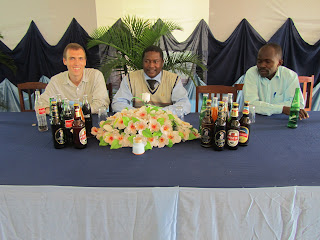A little over two weeks ago I had the bittersweet experience of saying goodbye to my Tanzanian home for the past year at Mzumbe. It wasn’t easy to bid farewell to all of my incredible students and fellow colleagues, but after a wonderful last week where I was able to share my appreciation with my school and my community, I left Mzumbe knowing that this experience along with the people that I was fortunate to call my neighbors and friends would stay with me long after I returned home.
My last week in Morogoro was filled with many goodbyes and farewells, and also many recollections of fond memories from the past year. I made a few final trips into town and enjoyed a lot of “last times” of the many routines and habits that were a part of my daily life in Tanzania. I took a final run in the fields, hand-washed my clothes one last time (thankfully!), and made one more trip to the market for some fresh fruits and vegetables. While engaging in these last experiences, I reminisced on the many memories of the past year and could truly reflect upon and appreciate how far I’ve come since the day I arrived in Tanzania.
 |
| One last Mzumbe morning parade |
In my last few days as a member of the Mzumbe staff and community, I taught my final classes, left some parting words of wisdom for my students and shared many memories and laughs with my fellow teachers. On my last day, I took some final pictures with my classes, exchanged contact information, and said my goodbyes to my community. In typical Mzumbe fashion, I was also given a great send-off reception by my fellow staff, during which we enjoyed some snacks and sodas together and shared our mutual appreciation of each other for the last year. Many teachers gave some humbling and heartfelt parting words and I also gave a final speech (with part of it in Kiswahili!) that could not begin to express the gratitude that I had for what I was fortunate to experience as a member of the Mzumbe community over the past year. It was a great way to say goodbye to all of the truly amazing people I got to know over the year that had such an unforgettable impact on my life.
 |
| A Fond Farewell Party |
 |
| Serving as the guest of honor |
Following one last night at Mzumbe filled with packing, and also one last meal with my neighbor and his family, I was picked up and transported with my other fellow volunteers to the beach town of Bagamoyo near Dar es Salaam for our End of Service Conference. The conference was a chance to relax, unwind, debrief and also prepare for the final journey home. It was also a time to share memories and laughs with my other WorldTeachers, who over the past year became incredibly close friends. Even though it was difficult to say goodbye to my Mzumbe community, it was probably even more difficult to say goodbye to my compatriots who accompanied me on this adventure. We went through many great times and difficult times together, but as a group we were successful in our endeavor as the first WorldTeach volunteers in Tanzania and as a result formed an incredibly close bond that will continue long after our service has ended. While I leave Tanzania with endless memories and life lessons, it’s the memories with the people and friends I gained that will live on most vividly.
 |
| WorldTeach Tanzania 2010-2011 together for the final time |
After a great last hurrah at our End of Service Conference, we traveled back to Dar es Salaam and were sent off to the airport where we would make the long-awaited trip back home. I could not have asked for a better final week in Tanzania. It was certainly an emotional time, but I left Tanzania with no regrets and with the satisfaction knowing that I got more out of my experience than I could have hoped for. There really is no word in Kiswahili for “goodbye” and that’s how I felt upon my departure. Even though I am leaving behind my amazing community and friends, I don’t feel as if I am saying a true goodbye. The memories of my experiences as a WorldTeach Volunteer will stay with me forever, which is all I need to feel as if I never truly said farewell.

















